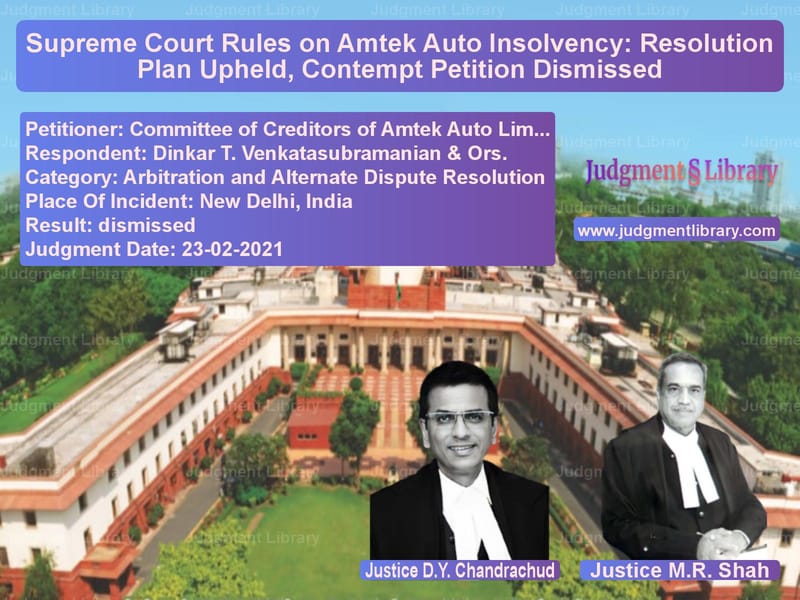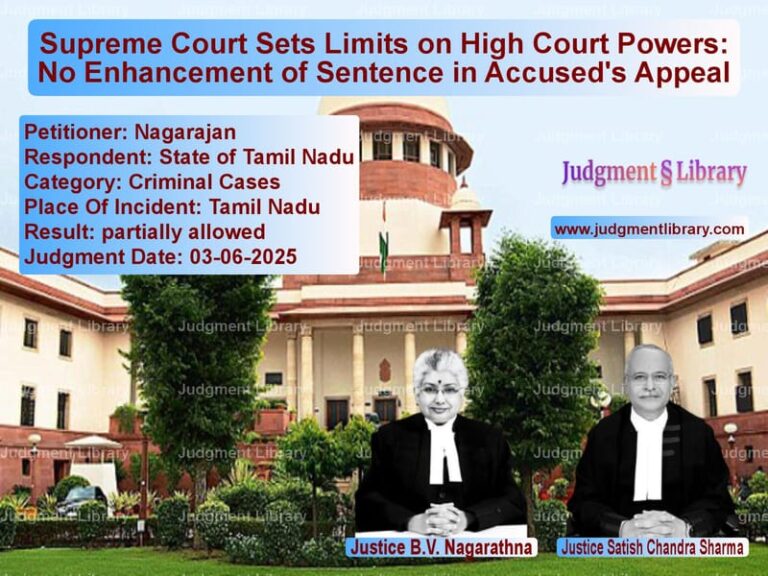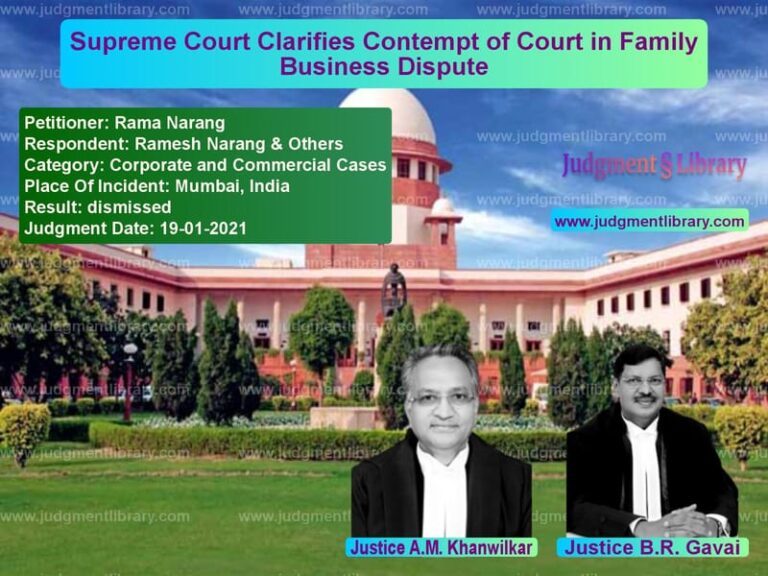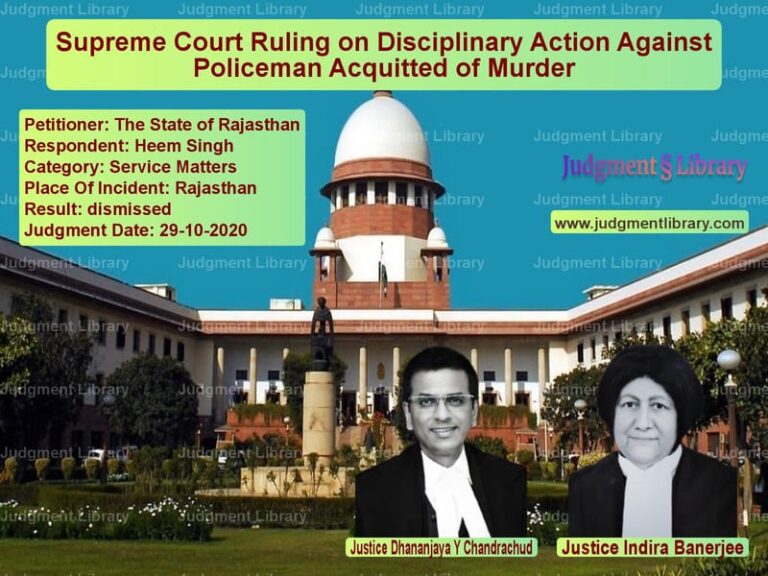Supreme Court Rules on Amtek Auto Insolvency: Resolution Plan Upheld, Contempt Petition Dismissed
The Supreme Court of India delivered a crucial judgment on February 23, 2021, in the case of Committee of Creditors of Amtek Auto Limited vs. Dinkar T. Venkatasubramanian & Ors., addressing the protracted insolvency resolution of Amtek Auto Limited. The Court dismissed a contempt petition filed by the Committee of Creditors (CoC) against Deccan Value Investors LP (DVI) and upheld the approval of the resolution plan while directing the National Company Law Appellate Tribunal (NCLAT) to resolve the pending appeal within a month.
The judgment, delivered by Justice D.Y. Chandrachud and Justice M.R. Shah, highlighted key aspects of India’s Insolvency and Bankruptcy Code (IBC) and reinforced the principle that a resolution applicant cannot unilaterally withdraw from an approved resolution plan.
Background of the Case
Initiation of Insolvency Proceedings
Amtek Auto Limited, a corporate debtor, was admitted for insolvency resolution under the Insolvency and Bankruptcy Code, 2016 (IBC), after the National Company Law Tribunal (NCLT) admitted an application under Section 7 of the IBC on July 24, 2017. An Interim Resolution Professional (IRP) was appointed, and subsequently, Dinkar T. Venkatasubramanian was confirmed as the Resolution Professional (RP).
Resolution Process and Approval of Plan
- The Resolution Professional invited resolution plans from interested parties on August 31, 2017.
- Two entities—Liberty House Group and Deccan Value Investors LP (DVI)—submitted resolution plans.
- Initially, Liberty House Group emerged as the highest bidder, but it later failed to comply with the approved plan.
- Following this, the Committee of Creditors (CoC) sought to initiate a fresh resolution process and reconsidered DVI’s plan as a viable alternative.
- On February 11, 2020, the CoC approved the resolution plan submitted by DVI with a voting share of 70.07%.
- The NCLT formally approved the resolution plan of DVI on July 9, 2020.
DVI’s Attempt to Withdraw
Despite the approval, DVI filed an application before the Supreme Court on June 12, 2020, requesting a modification of the Court’s earlier order, citing the impact of the COVID-19 pandemic on the financial viability of the resolution plan.
The Supreme Court dismissed the application on June 18, 2020, stating:
“The application made by the applicant for withdrawal of the offer is hereby rejected, and if he indulges in such practices, it will be treated as contempt of this Court.”
Contempt Petition Against DVI
The Committee of Creditors filed a contempt petition, arguing that despite the Supreme Court’s order rejecting DVI’s plea for withdrawal, DVI continued to obstruct the implementation of the resolution plan. Specifically, DVI:
- Failed to provide the second tranche of the performance bank guarantee of INR 150 crores.
- Refused to participate in the Implementation and Monitoring Committee (IMC).
- Attempted to invoke the force majeure clause under the resolution plan, citing the COVID-19 pandemic.
- Filed an appeal before the NCLAT seeking to set aside the NCLT’s approval of the resolution plan.
Supreme Court’s Observations and Ruling
Legal Standing of the Resolution Plan
The Supreme Court reaffirmed that once a resolution plan is approved by the CoC and the NCLT, it becomes binding on all stakeholders, including the resolution applicant. The Court ruled:
“The provisions of the IBC do not permit a resolution applicant to unilaterally withdraw from an approved resolution plan.”
Precedents on Commercial Wisdom of the CoC
Referring to the principles laid down in Essar Steel India Ltd. vs. Satish Kumar Gupta (2019), the Court held:
“The commercial wisdom of the CoC in approving a resolution plan is final and cannot be interfered with unless it violates the provisions of the IBC.”
Contempt Petition Dismissed
While acknowledging DVI’s failure to comply with the resolution plan, the Court chose not to invoke contempt jurisdiction. The judgment stated:
“Although DVI’s conduct has been lacking in bona fides, setting up an untenable plea does not, by itself, constitute contempt.”
Key Directions Issued
- The Supreme Court dismissed the application for rectification filed by DVI.
- The contempt petition was dismissed, with a warning to DVI against further non-compliance.
- The NCLAT was directed to dispose of DVI’s appeal within one month.
- DVI was prohibited from pleading force majeure in its NCLAT appeal.
Key Takeaways from the Judgment
- Resolution applicants cannot withdraw from an approved resolution plan.
- Commercial wisdom of the CoC remains paramount in insolvency proceedings.
- Force majeure claims must be raised during the resolution process, not after plan approval.
- Judicial intervention is limited once a resolution plan has been finalized and approved.
- Contempt jurisdiction is exercised cautiously, requiring willful disobedience to be established.
Impact of the Judgment
The ruling upholds the integrity of India’s insolvency framework by ensuring that resolution applicants cannot renege on their commitments post-approval. It also streamlines insolvency proceedings, preventing unnecessary delays caused by frivolous appeals and non-compliance.
Conclusion
The Supreme Court’s decision in Committee of Creditors of Amtek Auto Limited vs. Dinkar T. Venkatasubramanian & Ors. strengthens the insolvency process by ensuring that resolution applicants adhere to their commitments. The ruling reinforces the finality of CoC-approved resolution plans and deters attempts to obstruct corporate debt resolution under the guise of financial distress.
Petitioner Name: Committee of Creditors of Amtek Auto Limited.Respondent Name: Dinkar T. Venkatasubramanian & Ors..Judgment By: Justice D.Y. Chandrachud, Justice M.R. Shah.Place Of Incident: New Delhi, India.Judgment Date: 23-02-2021.
Don’t miss out on the full details! Download the complete judgment in PDF format below and gain valuable insights instantly!
Download Judgment: committee-of-credito-vs-dinkar-t.-venkatasub-supreme-court-of-india-judgment-dated-23-02-2021.pdf
Directly Download Judgment: Directly download this Judgment
See all petitions in Arbitration Act
See all petitions in Dispute Resolution Mechanisms
See all petitions in Enforcement of Awards
See all petitions in Judgment by Dhananjaya Y Chandrachud
See all petitions in Judgment by Mukeshkumar Rasikbhai Shah
See all petitions in dismissed
See all petitions in supreme court of India judgments February 2021
See all petitions in 2021 judgments
See all posts in Arbitration and Alternate Dispute Resolution Category
See all allowed petitions in Arbitration and Alternate Dispute Resolution Category
See all Dismissed petitions in Arbitration and Alternate Dispute Resolution Category
See all partially allowed petitions in Arbitration and Alternate Dispute Resolution Category







